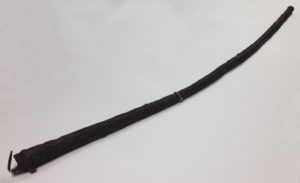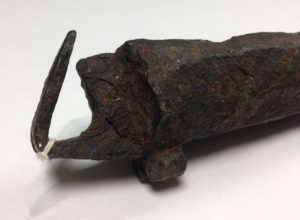
Barrel of a matchlock musket found at the Myles Standish home site, Duxbury, c. 1630–1710
Iron
Rehoboth Antiquarian Society Original Collection, Gift of Asaph L. Bliss
1600-002-001
The barrel of a matchlock musket that was likely used by Plymouth Colony militia commander Myles Standish (c. 1584–1656) is one of the more interesting gifts the Rehoboth Antiquarian Society received upon its founding in 1884.
Donor Asaph L. Bliss Jr., a Taunton hotelier, likely acquired it directly from James Hall, a Boston steel engraver who oversaw the 1856 excavation of the Myles Standish home site in Duxbury, Massachusetts, where the barrel was found. Hall’s endeavor is now considered one of the nation’s first professional archaeological digs. Two years later, in 1858, Henry Wadsworth Longfellow published his famous narrative poem The Courtship of Miles Standish, which romanticized Standish and ignored his reputation of committing ruthless acts against the Native Americans who interacted with the English. Standish became a folk hero in the eyes of many Victorian-era Americans, including the founders of the Rehoboth Antiquarian Society, who reverently described him as “one of the Pilgrim Fathers.” They must have been pleased to receive the musket barrel, especially because James Hall, a descendant of Standish, kept most of the finds of the excavation during his lifetime. (They are now housed at the Duxbury Rural and Historical Society and Pilgrim Hall Museum.) It is perplexing that Hall chose to sell or give away the musket barrel, one of the major discoveries of the dig according to former Pilgrim Hall curator Stephen O’Neill. Archaeologist Craig Chartier theorizes that Hall may have wanted it to come to Rehoboth, as this is where Standish’s last military campaign occurred in 1645 when he and his men headquartered here waiting to attack the Narragansetts. Notably, the artifact is considerably warped. This could have occurred in a fire, which Hall found evidence of during the excavation. Looking at other physical evidence, Chartier concludes the barrel was bent on purpose by someone to make it inoperable.
excavation during his lifetime. (They are now housed at the Duxbury Rural and Historical Society and Pilgrim Hall Museum.) It is perplexing that Hall chose to sell or give away the musket barrel, one of the major discoveries of the dig according to former Pilgrim Hall curator Stephen O’Neill. Archaeologist Craig Chartier theorizes that Hall may have wanted it to come to Rehoboth, as this is where Standish’s last military campaign occurred in 1645 when he and his men headquartered here waiting to attack the Narragansetts. Notably, the artifact is considerably warped. This could have occurred in a fire, which Hall found evidence of during the excavation. Looking at other physical evidence, Chartier concludes the barrel was bent on purpose by someone to make it inoperable.
